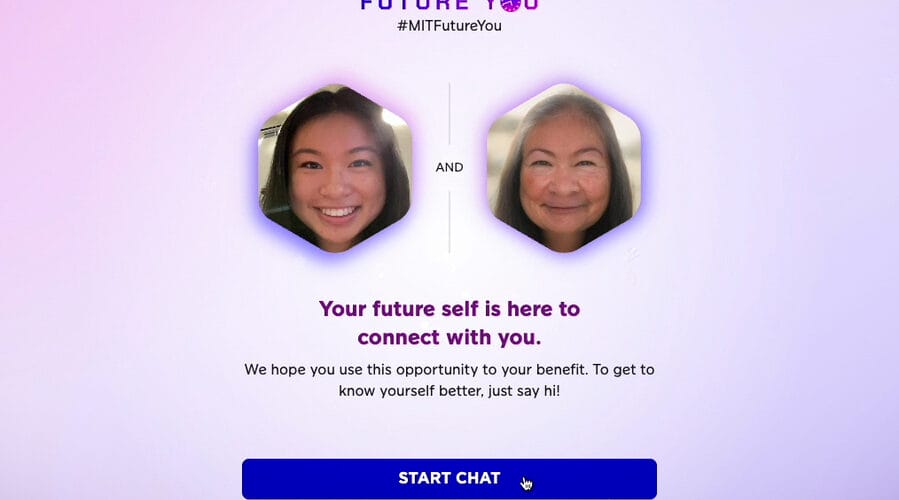The following report is by Massachusetts Institute of Technology (MIT) News (excerpts):
Have you ever wanted to travel through time to see what your future self might be like? Now, thanks to the power of generative AI, you can.
Researchers from MIT and elsewhere created a system that enables users to have an online, text-based conversation with an AI-generated simulation of their potential future self.
Dubbed Future You, the system is aimed at helping young people improve their sense of future self-continuity, a psychological concept that describes how connected a person feels with their future self.
Research has shown that a stronger sense of future self-continuity can positively influence how people make long-term decisions, from one’s likelihood to contribute to financial savings to their focus on achieving academic success.
Future You utilizes a large language model that draws on information provided by the user to generate a relatable, virtual version of the individual at age 60. This simulated future self can answer questions about what someone’s life in the future could be like, as well as offer advice or insights on the path they could follow.
In an initial user study, the researchers found that after interacting with Future You for about half an hour, people reported decreased anxiety and felt a stronger sense of connection with their future selves.
“We don’t have a real time machine yet, but AI can be a type of virtual time machine. We can use this simulation to help people think more about the consequences of the choices they are making today,” says Pat Pataranutaporn, a recent Media Lab doctoral graduate who is actively developing a program to advance human-AI interaction research at MIT, and co-lead author of a paper on Future You.
Users begin by answering a series of questions about their current lives, things that are important to them, and goals for the future.
The AI system uses this information to create what the researchers call “future self memories” which provide a backstory the model pulls from when interacting with the user.
For instance, the chatbot could talk about the highlights of someone’s future career or answer questions about how the user overcame a particular challenge. This is possible because ChatGPT has been trained on extensive data involving people talking about their lives, careers, and good and bad experiences.
The user engages with the tool in two ways: through introspection, when they consider their life and goals as they construct their future selves, and retrospection, when they contemplate whether the simulation reflects who they see themselves becoming, says Yin.
“You can imagine Future You as a story search space. You have a chance to hear how some of your experiences, which may still be emotionally charged for you now, could be metabolized over the course of time,” she says.
To help people visualize their future selves, the system generates an age-progressed photo of the user. The chatbot is also designed to provide vivid answers using phrases like “when I was your age,” so the simulation feels more like an actual future version of the individual.
AUTHOR COMMENTARY
As Solomon said, “There is no new thing under the sun.”
As far as I am concerned this is just astrology and horoscopes with a face-lift. Don’t use any of it. It’s all fake, and you’d be a fool to get advice from an AI algorithm.
Deuteronomy 18:10 There shall not be found among you any one that maketh his son or his daughter to pass through the fire, or that useth divination, or an observer of times, or an enchanter, or a witch, [11] Or a charmer, or a consulter with familiar spirits, or a wizard, or a necromancer. [12] For all that do these things are an abomination unto the LORD: and because of these abominations the LORD thy God doth drive them out from before thee.
[7] Who goeth a warfare any time at his own charges? who planteth a vineyard, and eateth not of the fruit thereof? or who feedeth a flock, and eateth not of the milk of the flock? [8] Say I these things as a man? or saith not the law the same also? [9] For it is written in the law of Moses, Thou shalt not muzzle the mouth of the ox that treadeth out the corn. Doth God take care for oxen? [10] Or saith he it altogether for our sakes? For our sakes, no doubt, this is written: that he that ploweth should plow in hope; and that he that thresheth in hope should be partaker of his hope. (1 Corinthians 9:7-10).
The WinePress needs your support! If God has laid it on your heart to want to contribute, please prayerfully consider donating to this ministry. If you cannot gift a monetary donation, then please donate your fervent prayers to keep this ministry going! Thank you and may God bless you.








The true intent is so the powers that ought not be can know what someone is thinking.
Please tell brother Bryan that my comment disappeared shortly after I post on yt and I have noticed others saying the same thing on other channels. Sounds like yt is deleting comments from real people and only allowing Ai bots to through.
Please tell him to not stop his sermons and its reaching so many. And we are fervently praying daily for him.
This is witchcraft, it’s like necromancy in reverse or fortune telling in a futuristic form, but it’s all an abomination all the same.
“Future You”? No need for some lame chatbot to tell you the future. If you’re an unbeliever, just look around you, then read the book of the Revelation of Jesus Christ in the KJV. In it is the future, guaranteed.
The strong delusion to believe a lie has to come from somewhere. Apparently the Mainstream media is insufficient to accomplish such a thing by itself.
It won’t tell them they might get saved and trust the Lord Jesus Christ, I guarantee ya that.